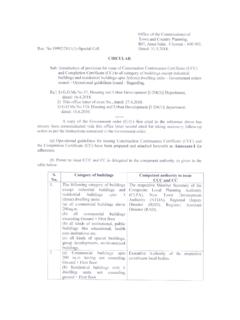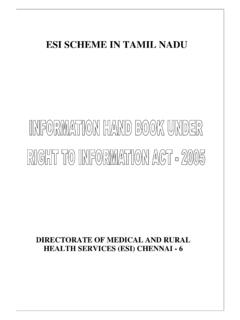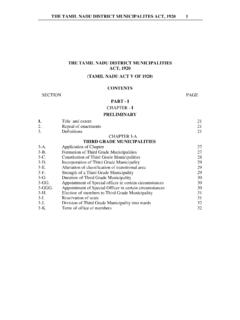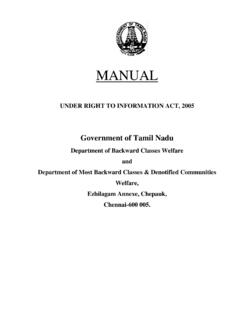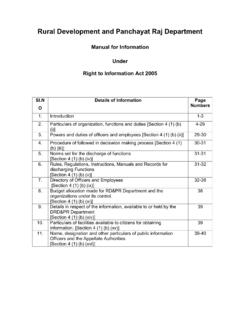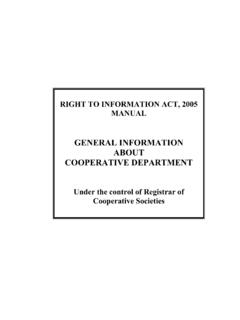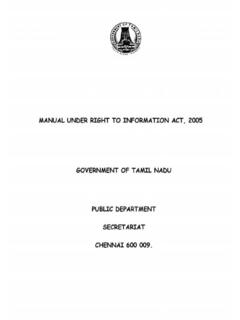Transcription of THE TAMIL NADU TOWN AND COUNTRY PLANNING ACT, …
1 THE TAMIL nadu town AND COUNTRY PLANNING ACT, 1971 ( TAMIL nadu Act 35 of 1972) An Act to provide for PLANNING the development and use of rural and urban land in the State of TAMIL nadu and for purposes connected therewith. BE it enacted by the Legislature of the State of TAMIL nadu in the Twenty-second year of the Republic of India as follows:- CHAPTER I. PRELIMINARY 1. Short title, extent and commencement (1) This Act may be called the TAMIL nadu town and COUNTRY PLANNING Act, 1971 . (2) It extends to the whole of the State of TAMIL nadu except the places declared to be cantonments under section 3 of the Cantonments Act, 1924 (Central Act II of 1924). (3) It shall come into force on such date as the Government may, by notification, appoint; and different dates may be appointed for different areas and for different provisions of this Act.
2 2. Definitions. In this Act, unless the context otherwise requires,- (1) agriculture includes horticulture, fruit-growing, seed growing, dairy-farming, livestock-breeding, the use of land as grazing land, or any other use of land where such other use is ancillary to any agricultural purposes; but does not include the use of any land attached to a building for the purpose of a garden to be used along with such building; and agricultural shall be construed accordingly; (2) amenities include streets, open spaces, parks, recreational grounds, play-grounds, water and electric supply, street lighting, sewerage, drainage, public works and other utilities, services and conveniences; (3) appropriate PLANNING authority or PLANNING authority means a regional PLANNING authority , a local PLANNING authority or a new town development authority , constituted under section 11; (4) area of bad lay-out or obsolete development means an area consisting of land which is badly laid out or of obsolete development, together with other lands contiguous or adjacent thereto, and which is defined by a development plan as an area of bad lay-out or obsolete development; (5) arterial road means any highway which connects towns with one another and facilitates movement of goods and people from one town to another.
3 (6) Board means the TAMIL nadu town and COUNTRY PLANNING Board constituted under section 5; (7) building includes- (a) a house, out-house, stable, latrine, godown, shed, hut, wall (other than a boundary wall) and any other structure whether of masonry, bricks, mud, wood, metal or any other material whatsoever; (b) a structure on wheels or simply resting on the ground without foundations; (c) a ship, vessel, boat, tent, van and any other structure used for human habitation or used for keeping or storing any article or goods; and (d) the garden, grounds, carriages and stables, if any, appurtenant to any building; (8) building-line means a line which is in rear of the street-alignment and to which the main wall of a building abutting on a street may lawfully extend and beyond which no portion of the building may extend; (9) building operations includes- (a) erection or re-erection of a building or any part of it; (b) roofing or re-roofing of a building or any part of a building or an open space; (c) any material alteration or enlargement of any building which involves alteration or enlargement, as the case may be, of more than one-tenth of the extent of the cubical contents of such building; (d) any material change in the use of a building including the conversion of the use of any part used for human habitation into a greater number of such parts.
4 (e) any such alteration of a building as is likely to affect its drainage or sanitary arrangements or affect in material respects its structural stability; and (f) construction of a door opening on any street or land not belonging to the owner; (10) commerce means the carrying on of any trade, business or profession, sale or exchange of goods of any type whatsoever and includes the running of, with a view to making profit, hospitals, nursing homes, infirmaries, educational institutions, and commercial , shall be construed accordingly; (11) commercial use includes the use of any land or building or part thereof for purposes of commerce or for storage of goods, or as an office, whether attached to industry or otherwise; (12) company means- (a) any company as defined in the Companies Act, 1956 (Central Act 1 of 1956), including any foreign company within the meaning of section 591 of that Act; (b) any body corporate; or (c) any firm or association (whether incorporated or not), carrying on business in the State of TAMIL nadu whether or not its principal place of business is situated in the said State.
5 (13) development means the carrying out of all or any of the works contemplated in a regional plan, master plan, detailed development plan or a new town development plan prepared under this Act, and shall include the carrying out of building, engineering, mining or other operations in, or over or under land, or the making of any material change in the use of any building or land: Provided that for the purposes of this Act, the following operations or uses of land shall not be deemed to involve development of the land, that is to say,- (a) the carrying out of any temporary works for the maintenance, improvement or other alteration of any building, being works which do not materially affect the external appearance of the building; (b) the carrying out by a local authority of any temporary works required for the maintenance or improvement of a road, or works carried out on land within the boundaries of the road.
6 (c) the carrying out by a local authority or statutory undertaker of any temporary works for the purpose of inspecting, repairing or renewing any sewers, mains, pipes, cables or other apparatus, including the breaking open of any street or other land for that purpose; (d) the use of any building or other land within the curtilage of a dwelling house for any purpose incidental to the enjoyment of the dwelling house as such; and (e) the use of any land for the purpose of agriculture, gardening or forest (including afforestation) and the use for any purpose specified in this clause of this proviso of any building occupied together with the land so used; (14) development authority means a regional PLANNING authority or a local PLANNING authority or a new town development authority constituted under this Act; (15) development plan means a plan for the development or re-development or improvement of the area within the jurisdiction of a PLANNING authority and includes a regional plan, master plan, detailed development plan and a new town development plan prepared under the Act; (16) Director means the Director of town and COUNTRY PLANNING appointed under section3.
7 (17) engineering operations includes the formation or laying out of means of access to a road or the laying out of means of water-supply, drainage, sewerage or of electricity cables or lines or of telephone lines; (18) Government means the State Government; (19) highway has the same meaning as in section 4of the National Highways Act, 1956 (Central Act XLVIII of 1956); (20) industrial use: includes the use of any land or building or part thereof for purposes of industry; (21) industry includes the carrying on of any manufacturing process as defined in the Factories Act, 1948 (Central Act LXIII of 1948) and industrial , shall be construed accordingly; (22) land includes benefits to arise out of land, and things attached to the earth or permanently fastened to anything attached to the earth; (23) local authority means- (i) the Municipal Corporation of Chennai or of Madurai; or (ii) a Municipal Council constituted under the TAMIL nadu District Municipalities Act, 1920 ( TAMIL nadu Act V of 1920).
8 Or (iii) a Township Committee constituted under the TAMIL nadu District Municipalities Act, 1920 ( TAMIL nadu Act V of 1920), or the TAMIL nadu Panchayats Act, 1958 ( TAMIL nadu Act XXXV of 1958) or under any other law for the time being in force, or the Mettur Township Act, 1940 ( TAMIL nadu Act XI of 1940), or the Courtallam Township Act, 1954 ( TAMIL nadu Act XVI of 1954), or, the Bhavanisagar Township Act, 1954 ( TAMIL Naddu Act XXV of 1954); or (iv) a Panchayat Union Council or a Panchayat constituted under the TAMIL nadu Panchayats Act, 1958 ( TAMIL nadu Act XXXV of 1958); (23-a) Chennai Metropolitan PLANNING Area: means the City of Chennai and such contiguous area of such City as the Government may, from time to time, specify by notification in the TAMIL nadu Government Gazette: Provided that before issuing such notification under this clause the Government shall give any inhabitant or any local authority or institution in such contiguous area a reasonable opportunity for showing cause against the proposal and shall consider its objections or suggestions if any; (24) major street means a main street connecting different localities; (25) means of access includes any means of passage, whether private or public, for vehicles or for pedestrians and includes any street.
9 (25-a) Metropolitan Development Authority means the Chennai Metropolitan Development Authority established under section 9-A; (26) National Highway means any highway declared to be a national highway under section 2 of the National Highways Act, 1956 (Central Act XLVII of 1956); (27) navigable canal means any waterway or canal or any other source of a waterway or canal for the public carriage of persons, animals or goods by means of yachts or boats; (28) occupier includes- (a) any person for the time being paying or liable to pay to the owner the rent or any portion of the rent of the land or building or part of the same in respect of which the word is used or damages on account of the occupation of such land, or building or part; and (b) a rent-free occupant; (29) owner includes the person for the time being receiving or entitled to receive, whether on his own account or as agent, trustee, guardian, manager or receiver for another person, or for any religious or charitable purposes, the rent or profits of the property in connection with which the word is used.
10 (30) PLANNING area means any area declared to be a regional PLANNING area, local PLANNING area or a site for a new town under this Act; (31) plot means a continuous portion of land held in one ownership other than land used, allotted or restored for any public purpose or any purpose connected with local administration carried on by any local authority; (32) private street means any street, road, square, court, alley, passage or riding-path, which is not a public street but does not include a pathway made by the owner of premises on his own land to secure access to or the convenient use of such premises; (33) public building means any building to which the public or any class or section of the public are granted access or any building which is open to the public or any class or section of the public and includes any buil
